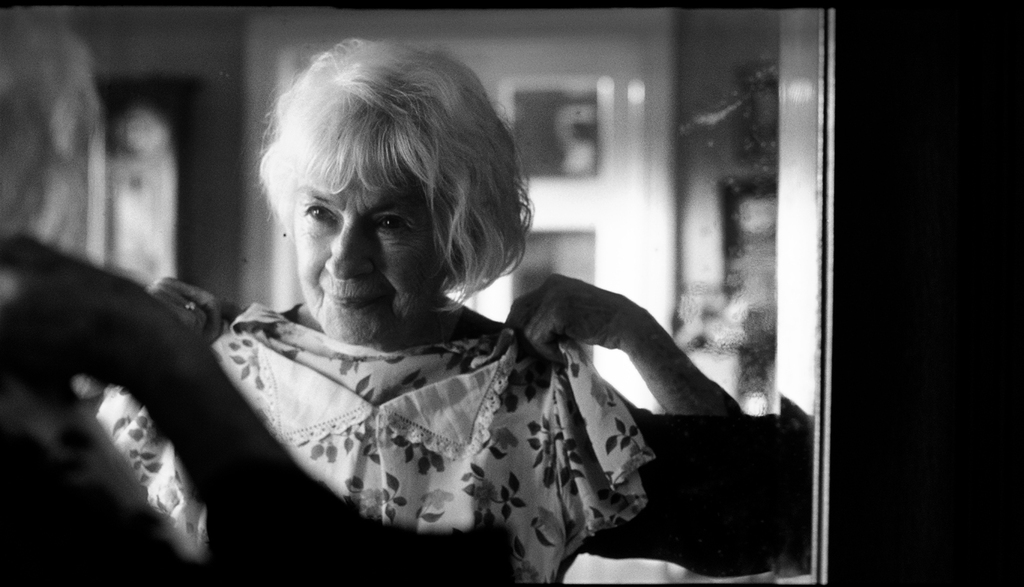
TIME TO DIE
Poland, 2007, 104 minutes, Black and white.
Directed by Dorota Kedzierzawska.
Here is a fine film about ageing and dying. The director has dedicated the film to her grandmother so one presumes that this is something of a memoir and a tribute.
Shot in expressive black and white, most of the film is confined to the old home in which the 91 year old old lady lives. We get to know the rooms, look out through the framing of the windows, go out into the grounds now and again and visit the adjacent old house on her property. What might seem a limited plot and viewpoint becomes a fine film.
The impressive performance of Danuta Szaflarska holds the film together as well as holding audience attention throughout the film. Supporting characters appear only briefly. However, the other principal character is the dog who serves as a companion, something of a guardian angel and the surrogate for the audience as it listens to the old lady’s reminiscences and the manifestations of her thoughts and feelings. The dog is superbly photographed, limpid eyes, licking lips, soulful looks. Some have suggested a worthy candidate for a Best Supporting Actor award!
As the old lady looks back at her life, she feels more alone and disappointed. Her son is a negligible presence, dominated by his wife and saddled with an overweight, surly daughter whom her grandmother tries to like and help but who gives up (long after we the audience have given up on this greedy, bored, self-centred eight year old). The house which she loves is in need of repair, something which is not likely. While she has a spirited attitude towards life (especially invigorated by going out into a storm and relishing the beating rain), she is tempted to give up and literally lie down and die. Her reflections on her life at this stage are sadly pessimistic.
But, there is more to the film. There is some hope and the exhilaration of the last part of the film as the old lady decides how she can give meaning to her long life reminds us that life is worth living.
1.The impact of the film? Themes of age, life, death, meaning of life? The Polish tone of the film? Universal appeal and meaning?
2.The black and white photography, its effect? The house, the grounds, the framing of the outside through the windows and the old lady looking out? The detail of the house, the grounds? The audience confined within the house and grounds? The end and the camera moving towards the sky and openness, Heaven?
3.The title, the old lady, born in 1915, aged ninety-one, the span of her life, the experience of the war, the Russian era, her relationship with her son, her ungrateful granddaughter? The importance of Philadelphia, the dog, the bond, alone?
4.The actress’s performance, centre screen, expressive, her appearance, action, talking to herself, talking to the dog? Creating a rounded character? Communicating the interior life? Holding the audience attention?
5.The filming of the dog, Philadelphia, the nickname Phila? The dog as companion, guardian angel, listening to the old lady, sharing, the eyes, the licking of the lips, movement, barking? The dog becoming a significant character? The pervading presence in the film? Grief at the end?
6.The character of the old lady, alone, the looking back on her life, the death of her companion, the issue of moving the piano, moving, inviting her son and his family to come in, the daughter-in-law and her criticisms? The granddaughter and her ingratitude? Their moving in or not? The negotiations? The band, her listening to the practice? The kids, the swing, their commenting adversely on her? The granddaughter on the swing, unable to swing, the old lady showing her the house, her being bored? The discussions with her son? The house, her cherishing it, the infrequent memories of her husband? Drinking the liqueur, the storm and her vitality and going out in the rain, sitting, watching, the binoculars?
7.The opening, her going to the doctor, the rudeness of the doctor? Her reaction? Her final decision to die, getting out the black dress, lighting the candle, closing the curtains, lying on the bed, reciting Shakespeare’s Sonnet? And suddenly getting up and deciding not to die?
8.Her reaction to coming to life again, watching the band, visiting the couple, moving the piano, getting the jewels, calling the notary, listening to the bequest, the band moving in, the noise, the kids, curious, going upstairs, the smashing of the cup? Her going upstairs?
9.The portrait of her son, the negotiations, the strained relationship with his mother? Her memories of him, cherishing the memories, on the swing, the photos of him?
10.The granddaughter, people calling her fat, her petulance, on the swing, bored in the house, the walnuts, greedy, wanting the ring, refusing to call her grandmother Grandma? The final decision about the ring going to her mother?
11.The piano, the jewels, the condition of the house being renewed?
12.The meaning of life, the God talk, the picture of the Sacred Heart, the rosary beads? The old lady thinking over the point of her life? Its seeming futility? Her decision to make a point of her life in the bequest?
13.Going upstairs, ready to die, her talk about Heaven, wanting the companionship of the dog, not having to drink tea out of a mug …?
14.The overall impact of the film? Humanity? A sense of the transcendent?